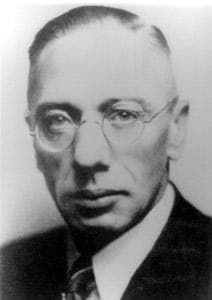
Blessed Nikolaus Gross
Blessed
Feast Day: January 15
Birth: September 30, 1898
Death: January 1, 15
Biography
Blessed Nikolaus Gross was born on September 30, 1898, in Niederwenigern, a village in the Ruhr region of Germany. He grew up in a devout Catholic family and from an early age showed a strong sense of faith and social justice. Nikolaus was married and a father of seven children, which added to his deep responsibilities and commitment to his family and community.
At the age of 19, Nikolaus became a member of the Christian miners' labor union, displaying his dedication to the rights and welfare of workers. By the time he was 22, he had already become the union's secretary. In addition to his work in the labor union, Nikolaus actively participated in various political activities. He joined the Zentrum Christian Party at the age of 20 and contributed to their effort in advocating for Christian values and social justice.
Recognizing the power of communication and media, Nikolaus began his work at the Westdeutschen Arbeiterzeitung, the newspaper of the Catholic Workers' Movement, when he was just 22 years old. He quickly rose through the ranks, eventually becoming its director at the age of 24. Through his position, Nikolaus aimed to counteract the lies and harmful effects of Nazi propaganda, which had begun to gain significant influence in Germany.
Nikolaus Gross was an early and non-violent opponent of Nazism. He courageously worked with distinguished Catholic intellectuals who also opposed the regime, using their collective intellect to challenge and expose the falsehoods propagated by the Nazis. As a Cologne-based figure, Nikolaus actively contributed to the revolt of consciences against Hitler, despite the perilous risks involved.
Due to his defiance and resistance against the Nazi regime, Nikolaus was declared an enemy of the state. In 1938, his newspaper was forcefully shut down by the authorities, seeking to silence his influence. However, undeterred by the oppression, Nikolaus continued publishing an underground edition of the newspaper, further disseminating the truth and inspiring others to resist the Nazi ideology.
In 1944, Nikolaus attempted to organize a resistance among Catholic workers, preparing for the planned assassination of Hitler on July 20. Although neither he nor the members of his group were implicated in the assassination attempt, Nikolaus was arrested on August 12, 1944, under charges of treason. After a trial held by the People's Court, he was sentenced to death on January 15, 1945.
On that fateful day, in the Berlin-Plotzensee prison, Blessed Nikolaus Gross was executed for his unwavering commitment to defending human dignity, justice, and conscience in the face of Nazi tyranny. His body was cremated, and the ashes were scattered, symbolizing his final sacrifice.
Blessed Nikolaus Gross's courageous and selfless actions during the dark period of Nazi rule have earned him the title of martyr. His unwavering faith, steadfast opposition to evil, and commitment to the truth were rightly recognized and honored by the Catholic Church. On July 7, 2001, Pope John Paul II declared Nikolaus Gross venerable, acknowledging his martyrdom. Subsequently, on October 7, 2001, Pope John Paul II beatified him at Saint Peter's Basilica in Rome, Italy, granting him the title of Blessed Nikolaus Gross. His feast day is celebrated on January 15, commemorating the day of his execution and martyrdom.